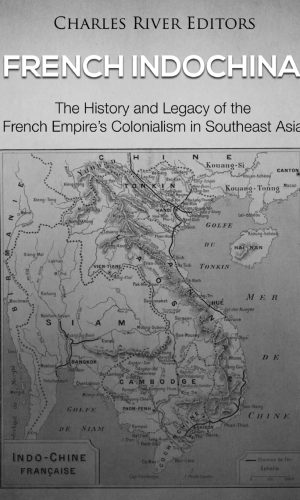France
-
Bismarck’s War: The Franco-Prussian War and the Making of Modern Europe
‘Compassionate and thought-provoking history’ Daily Telegraph
‘Superb on the human consequences of war, ravishing in its evocations of wartime life’ The Times
‘Fresh and compelling … a tour-de-force’ David A. Bell
Less than a month after it marched into France in summer 1870, the Prussian army had devastated its opponents, captured Napoleon III and wrecked all assumptions about Europe’s pecking order. Other countries looked on in helpless amazement. Pushing aside further French resistance, a new German Empire was proclaimed (as a deliberate humiliation) in the Palace of Versailles, leaving the French to face civil war in Paris, reparations and the loss of Alsace and Lorraine.
Bismarck’s War tells the story of one of the most shocking reversals of fortune in modern European history. The culmination of a globally violent decade, the Franco-Prussian War was deliberately engineered by Bismarck, both to destroy French power and to unite Germany. It could not have worked better, but it also had lurking inside it the poisonous seeds of all the disasters that would ravage the twentieth century.
Drawing on a remarkable variety of sources, Chrastil’s book explores the military, technological, political and social events of the war, its human cost and the way that the sheer ferocity of war, however successful, has profound consequences for both victors and victims.
Read more
£24.50£28.50 -
French Indochina: The History and Legacy of the French Empire’s Colonialism in Southeast Asia
*Includes pictures
*Includes online resources and a bibliography for further reading
“Without Empire France today would only be a liberated country. Thanks to her Empire she is today a victorious country.” – French Guianan lawyer and politician, Gaston Monnerville
The U.S. Naval Station Argentia, located in Placentia Bay, a sheltered harbor on Newfoundland Island, was the unlikely setting for one of the most pivotal summit meetings of the 20th century. The meeting took place on August 9, 1941. World War II was in its second year, the British had won the Battle of Britain, but were still encircled by German U-Boats, and the British fleet was being decimated in the North Atlantic. In North Africa, a contest of armor was underway as Axis and Allied armies fought for control of Egypt, while Britain and her Commonwealth allies stood alone against the mighty German Wehrmacht.
Roosevelt, however, pictured a very different post-war world than his British counterpart, Winston Churchill. When he and Churchill met at what came to be known as the Atlantic Conference, Churchill’s pleas for U.S. manpower and aid were accepted, but only under clear conditions. If the United States was to come to the aid of Britain, it would be for the purpose of defeating the Germans and the Japanese and not to support the insupportable institutions of empire. Britain and, by extension, France and Portugal, the only remaining major European shareholders in foreign empire, would have to commit to decolonization as a basic prerequisite of substantial U.S. assistance.
Churchill, a vocal and forceful proponent of empire and a man of the generation that had conquered the world, did not receive this news well. On the other side of the world, British and allied European Asian colonies lay very much in the path of the Japanese imperial march into Southeast Asia. However, as the inevitability of war grew daily, the nationalist movement in India was also beginning to gather pace. Without India and Indian manpower, war with Japan would be lost before it could begin. The Indians in a sense could hold the British hostage, and ultimately, in exchange for Indian cooperation in the war, the British would first have to commit to a post-war independence process.
Meanwhile, the British were not the only European power to take note of this development. The French too were a major imperial power with a great deal to lose from such a monumental change, but their view of the global chessboard was somewhat different. France lay under German occupation, and an armistice had been signed on behalf of the French nation by Marshall Philippe Pétain, commencing the era of Vichy France. In London, meanwhile, the firebrand French General Charles de Gaulle urged a continuation of the resistance, believing the French mainland to be only a small part of the picture. France was much more than just France. De Gaulle established the Free French movement in Britain, based on the loyalty and the ongoing Free French control of a majority of her overseas territories. The Free French movement and the Free French army based themselves in Francophone Africa. The saga of the Free French movement would impact the war in both North Africa and Europe, but most specifically, it would serve to radically redefine the French view of itself and her relationship with her overseas territories. Most importantly, it would set the tone for a style of decolonization very different from the British, and perhaps not surprisingly, things would not go smoothly, especially with the geopolitics of the Cold War affecting matters.
French Indochina: The History and Legacy of the French Empire’s Colonialism in Southeast Asia analyzes the colonization of Southeast Asia and what happened as a result of the decolonization. Along with pictures of important people, places, and events, you will learn about the French in Southeast Asia like never before.Read more
£8.00 -
Gender and the Politics of History (Gender and Culture Series)
This landmark work from a renowned feminist historian is a foundational demonstration of the uses of gender as a conceptual tool for cultural and historical analysis. Joan Wallach Scott offers a trenchant critique of the compartmentalization of women’s history, arguing that political and social categories are always fundamentally shaped by gender and that questions of gender are essential to considerations of difference in history. Exploring topics ranging from language and class to the politics of work and family, Gender and the Politics of History is a vital contribution to feminist history and historical methodology that also speaks more broadly to the ongoing redefinition of gender in our political and cultural vocabularies.This anniversary edition of a classic text in feminist theory and history shows the evergreen relevance of Scott’s work to the humanities and social sciences. In a new preface, Scott reflects on the book’s legacy and implications for contemporary politics as well as what she has reconsidered as a result of her engagement with psychoanalytic theory. The book also includes a previously unpublished essay, “The Conundrum of Equality,” which takes up the question of affirmative action.
Read more
£22.40£23.80 -
Napoleon’s Wars: An International History, 1803-1815
No other soldier has provoked as much anger or as much fervour as Napoleon Bonaparte. Was he a monster, driven on by an endless, ruinous quest for military adventure – or was he a social and political visionary, brought down by petty reactionaries clinging to their privileges?
Charles Esdaile’s major new work reframes our understanding of Napoleon. Napoleon’s Wars looks beyond the insatiable greed for glory to create a new, genuinely international context for Napoleon’s career. The battles themselves Esdaile sees as almost side-effects, the consequences of rulers being willing to take the immense risks of fighting or supporting Napoleon – risks that could result in the extinction of entire countries and regimes.
Read more
£13.60£16.10Napoleon’s Wars: An International History, 1803-1815
£13.60£16.10 -
The German Invasions of France during the World Wars: The History of Germany’s Campaigns in World War I and World War II
World War I, also known in its time as the “Great War” or the “War to End all Wars”, was an unprecedented holocaust in terms of its sheer scale. Fought by men who hailed from all corners of the globe, it saw millions of soldiers do battle in brutal assaults of attrition which dragged on for months with little to no respite. Tens of millions of artillery shells and untold hundreds of millions of rifle and machine gun bullets were fired in a conflict that demonstrated man’s capacity to kill each other on a heretofore unprecedented scale, and as always, such a war brought about technological innovation at a rate that made the boom of the Industrial Revolution seem stagnant. The enduring image of World War I is of men stuck in muddy trenches, and of vast armies deadlocked in a fight neither could win. It was a war of barbed wire, poison gas, and horrific losses as officers led their troops on mass charges across No Man’s Land and into a hail of bullets.If trench warfare was an inevitability during the war, it is only because the events leading up to the First Battle of the Marne were quite different. The armies at the beginning of the war moved quickly through the land, but the First Battle of the Marne devolved into a bloody pitched battle that led to the construction of trenches after the Germans retreated, blocked in their pursuit of Paris. When the aftermath disintegrated into a war between trenches, some Germans thought they had the upper hand since they were occupying French territory, but with fewer soldiers than the combined Allied nations and fewer resources and supplies, it was possibly only a matter of time before they were ultimately defeated. The commander of the German armies, General Helmuth von Moltke, allegedly said to Kaiser Wilhelm II immediately after the First Battle of the Marne, “Your Majesty, we have lost the war.” Winston Churchill himself would later reference that anecdote, writing, “Whether General von Moltke actually said to the Emperor, ‘Majesty, we have lost the war,’ we do not know. We know anyhow that with a prescience greater in political than in military affairs, he wrote to his wife on the night of the 9th, ‘Things have not gone well. The fighting east of Paris has not gone in our favour, and we shall have to pay for the damage we have done.’”
One of the most famous people in the world came to tour the city of Paris for the first time on June 28, 1940. Over the next three hours, he rode through the city’s streets, stopping to tour L’Opéra Paris. He rode down the Champs-Élysées toward the Trocadero and the Eiffel Tower, where he had his picture taken. After passing through the Arc de Triomphe, he toured the Pantheon and old medieval churches, though he did not manage to see the Louvre or the Palace of Justice. Heading back to the airport, he told his staff, “It was the dream of my life to be permitted to see Paris. I cannot say how happy I am to have that dream fulfilled today.” Four years after his tour, Adolf Hitler would order the city’s garrison commander, General Dietrich von Choltitz, to destroy Paris, warning his subordinate that the city “must not fall into the enemy’s hand except lying in complete debris.”
Of course, Paris was not destroyed before the Allies liberated it, but it would take more than four years for them to wrest control of France from Nazi Germany after they took the country by storm in about a month in 1940. That said, it’s widely overlooked today given how history played out that as the power of Nazi Germany grew alarmingly during the 1930s, the French sought means to defend their territory against the rising menace of the Thousand-Year Reich. As architects of the most punitive measures in the Treaty of Versailles following World War I, France was a natural target for Teutonic retribution, so the Maginot Line, a series of interconnected strongpoints and fortifications running along much of France’s eastern border.
Read more
£4.70 -
The Napoleonic Wars (1805 – 1815)
The Napoleonic Wars (1805 – 1815) were an epoch of unprecedented upheaval and destruction that reshaped the landscape of the history of ancient France and the broader European continent. In this comprehensive book, we embark on a captivating journey through this tumultuous decade, offering a detailed exploration of the triumphs and tragedies that marked Napoleon Bonaparte’s reign as the self-crowned Emperor of the French.
From the brilliance of Napoleon’s early victories, including his masterpiece at Austerlitz in 1805 and the smashing of Prussia at Jena in 1806, to the catastrophic invasion of Russia in 1812 and the bloodiest day at Borodino, we traverse the peaks and valleys of his fortunes. This narrative takes us through the horrors of the French occupation of Spain and Portugal, the great struggles of 1813, and Napoleon’s doomed defense of Paris in 1814. Along this historical voyage, we encounter moments of military genius and fatal blunders that left an indelible mark on the history of ancient France.
The climax of this narrative occurs in 1815, where we bear witness to history’s most renowned generals meeting on the battlefield for the first and only time: Napoleon Bonaparte, Emperor of the French, and the Duke of Wellington. The epic and brutal Battle of Waterloo unfolds, ultimately determining the fate of Europe.
This book provides a comprehensive chronicle of the entire span of the Napoleonic Wars, from the zenith of Napoleon’s power in 1805 to his final defeat at Waterloo in 1815. It is a compelling journey through one of the most captivating and tumultuous periods in history, interwoven with the grand campaigns, dramatic battles, and the rise and fall of an extraordinary leader, all set against the backdrop of the history of ancient France.
Order your copy now!
Read more
£4.70 -
Thirsty Work: Matt Skinner
Serious but unpretentious, inspiring and fun, Thirsty Work celebrates wine and all that goes into making it and all who are involved in sharing it. Based on the way he teaches the subject of wine to his students at Fifteen, Matt Skinner breaks down all the information you need to feel confident when choosing and drinking wine. All the key topics in wine are covered – from how to taste to the key grapes; where and how wine is made to the range of styles – and his 24 “hour faces of wine” working around the clock, feature all the people who are involved in bringing wine to your table. In everyday terms, Skinner presents his subject on a unique and personal level.Read more
£0.50







